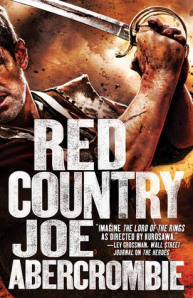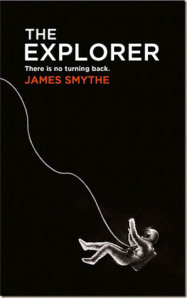February 16, 2014: My January Reading List – Capsule Reviews! The mystery of the orange oatmeal solved! Stargate Atlantis rewatch! Hot Zone!
In my bid to beat 2013′s paltry 70-something “books read” total, I’ve re-established this blog’s Book of the Month Club and redoubled my own reading efforts. Now I’m sure that, next to reading a good book, there’s nothing many of you bibliophiles appreciate more than a good recommendation. A nd so, in keeping with yet another tradition, I’m going to offer a monthly round-up of the books I’ve read accompanied by mini capsule reviews (or simply thoughts, let’s call them thoughts) for those of you seeking a little literary direction.
My January reads, eleven in all…
Joe Abercrombie has distinguished himself in a fairly crowded field, delivering gritty, visceral, yet darkly humorous tales that fly in the face of established high fantasy conventions. His world-building is as unique and richly textured as the colorful characters who battle and banter their way through his stories, and I list him among my very favorite authors. Period. Beginning with his first book, The Blade Itself, and continuing through five subsequent novels, I can honestly say “I’ve never read an Abercrombie book I haven’t loved.”. Red Country is his latest and Joe at his consistent best, a story about a young girl, Shy South, who sets off to rescue her younger siblings from a group of murderous outlaws. She is aided in her quest by Lamb, her (seemingly) spineless soft-spoken stepfather, and the unlikeliest of allies in a group of risk-averse mercenaries. A hell of a lot of fun.
An accident changes the lives of a young boy and his mother, setting off a bewildering, tragic chain of events. The story unfolds in the past and present: 1972, in the immediate aftermath of the triggering incident, and decades later following its destructive repercussions. The protagonists of the twin narratives are engaging and the premise is interesting, but the secondary characters are weak: the distant husband and father, the low class opportunist, the shallow fellow wives. James, the childhood friend, offers a suggestion of intrigue that is hinted at but never fully realized.Perhaps more frustrating are the two female main characters who, while possessed of great depth, demonstrate behavior that leave the reader questioning their motivations. There’s the mother who is so affected by an unfortunate turn of events that she completely loses all sense of logic. And then there’s the woman who befriends a co-worker with mental issues and, mysteriously, falls in love with him. I say “mysteriously” because, despite the development’s effectiveness in pushing the story toward a satisfying emotional resolve, I simply didn’t buy it. In both cases, despite the great writing, there’s a disconnect between the set up and pay off. Equally detached are the twin narratives that, while linked, don’t ultimately dovetail in satisfactory fashion.
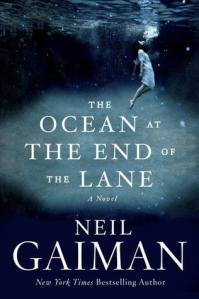 THE OCEAN AT THE END OF THE LANE - Neil Gaiman
THE OCEAN AT THE END OF THE LANE - Neil Gaiman
“Write what you know,”they say, and while Neil Gaiman may not actually know magic and monsters and otherworldly spirits, you’d be forgiven for suspecting otherwise. His stories are fiercely creative and, at time same time, underpinned with an elegiac beauty that resonates with readers. Here, its the power of memories and the force of nostalgia that drive the narrative as our unnamed protagonist revisits his hometown, rediscovering long-forgotten secrets and friendship. While it may lack the depth and dark complexity of Gaiman’s other works (Sandman and American Gods come readily to mind), this short novel is no less stirring.
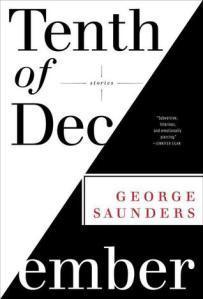 TENTH OF DECEMBER - George Saunders
TENTH OF DECEMBER - George Saunders
A diverse selection of short stories ranging from soberly subversive to wickedly weird. There’s no denying Saunders’ talent or his ability to craft stories that engender a powerful reader response, in my case ranging from mild irritation to utter delight. One of my favorite entries is “The Semplica Girl Diaries” which focuses on a middle-class father’s attempts to keep up with his wealthier neighbors by gifting his young daughter a group of living human lawn ornaments for her birthday. The narrative unfolds in darkly humorous – and horrifying – fashion, its bizarre developments a pointed critique of consumerism and third world labor. Other stories prove equally clever and elegantly acerbic. ”Escape from Spiderhead” offers a glimpse at a savage and deadly but efficiently-run pharmaceutical experiment. In “Sticks”, a boy charts his father’s emotional descent through the decorative evolution of the very special pole standing in their front yard. ”Al Roosten”, meanwhile, is a modern day Walter Mitty leached by despair. Provocative.
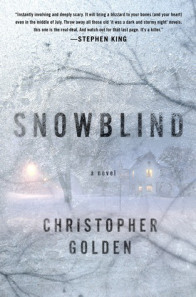 SNOWBLIND - Christopher Golden
SNOWBLIND - Christopher Golden
In man ways reminiscent of Stephen King’s small town horror, this novel pales in comparison. Whereas King’s characters transcend their literary commonalities, the characters in Snowblind don’t really offer much beyond their simple introductions, ultimately undone by predictable developments and stock dialogue. It’s a great, creepy set-up that, like a lot of horror, fails to follow-through on its effective start. The ominous threat become decidedly less frightening as the story moves along, hampered by some confusing rules surrounding the abilities and motivations of the snow entities’ former victims. More frosty than chilling.
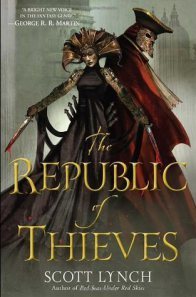 THE REPUBLIC OF THIEVES - Scott Lynch
THE REPUBLIC OF THIEVES - Scott Lynch
Scott Lynch’s The Lies of Locke Lamorra ranks among my Top 5 All-Time Fantasy Reads so I was greatly looking forward to this book, the third in the series. Events pick up where they left off in Red Seas Under Red Skies, with Locke poisoned and near death. His best friend and partner in crime, Jean, must find a way to save his life – but the solution will involve a sketchy deal, political intrigue, and a surprising someone from our hero’s past. The narrative shifts back and forth between two timelines, the first involving Locke and Jean’s efforts to rig a local election, the second a flashback to a younger Locke and his relationship with fellow rogue, Sabetha. Each book in the series is distinct, this latest entry surprisingly somber in comparison to the light-hearted tone of the first. On the one hand, a little more straight-forward and less “fun” than the previous instalments; on the other hand, certainly more nuanced in its exploration of our protagonist and his complicated love life.
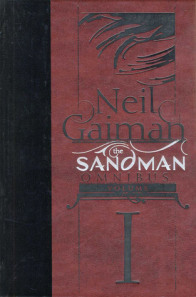 THE SANDMAN OMNIBUS, volume 1 - Neil Gaiman
THE SANDMAN OMNIBUS, volume 1 - Neil Gaiman
At some 1040 pages long, this massive hardcover tome is just the first half of Neil Gaiman’s award-winning opus which tells the story (stories) of Dream, the rulers of Dreams. It has the feel of a musical score,the narrative lulling and swelling, rising and falling, building to crescendos and then quietly fading. The tales are diverse but equally inspired. In one, Dream travels to Hell to free a long-abandoned love only to find the place shuttered as Lucifer closes up shop. In another, we discover the true origins of Shakespeare’s Midsummer Night’s Dream. An enormous creative accomplishment.
What starts off as a grounded, impressive SF tale takes an interesting time-travel twist – but then is undone by irritating implausibilities that stand out in contrast to a hitherto engaging and believable narrative. As a reader, I can accept the fictional parameters set down by the book – the near future space journey, even the rules of the time travel itself – but I have to draw the line when forced to accept the fact that a future version of our hero is able to make his way through the small ship, hiding within its walls, completely unnoticed by the rest of the crew.
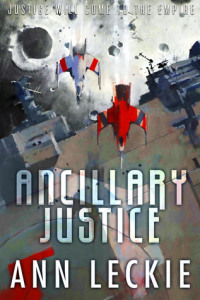 ANCILLARY JUSTICE - Anne Leckie
ANCILLARY JUSTICE - Anne Leckie
The mysterious Breq is much more (and less!) than she appears. Once a military starship possessed of Artificial Intelligence, she now exists as merely one of the thousands of former ancillaries (a.k.a. corpse soldiers) that existed as extensions of her former self. Reduced to a single fragile human body, fueled by the memories of her powerful past, she sets out on a seemingly impossible mission of vengeance. Sound cool? Well, it is. And smart. I haven’t read an SF novel this engrossing in quite a while. And, for this very reason, I haven’t been so frustrated by an ending in even longer. Admittedly, Breq’s “plan” isn’t much of one and the fact that this book is the first in a series should have prepared me, but I found the conclusion highly unsatisfying nevertheless.
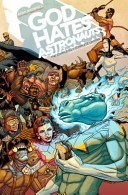 GOD HATES ASTRONAUTS - Ryan Brown
GOD HATES ASTRONAUTS - Ryan Brown
“I don’t want to oversell what Ryan has accomplished here, but I gave God Hates Astronauts to a blind man and he regained his sight.” - Jonathan Hickman (The Avengers, Fantastic Four, The Manhattan Projects)
Okay, it may not cure blindness but this book will definitely cure boredom – and re-energize jaded comic book readers. Without a doubt, the most outrageous graphic novel I’ve ever read, God Hates Astronauts focuses on the adventures of The Power Persons Five who, under orders from NASA, are tasked with keeping farmers from firing their home made rockets into space. And then it gets really weird. I mean REALLY. Crazy, at times laugh out loud funny.
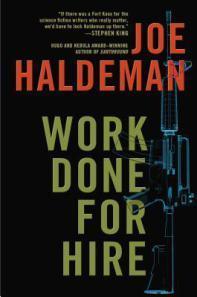 WORK DONE FOR HIRE - Joe Haldeman
WORK DONE FOR HIRE - Joe Haldeman
Following an enormous stage weight in which we are introduced to a writer working on the novelization of an upcoming movie, alternating between his life and the cheesy book he is writing, the story actually begins – approximately 100 pages into this novel – when the writer receives a rifle and some mysterious instructions. What follows is a conspiracy-laden (or “leaden”) adventure as our hero tries to figure out what is going on and who is pulling the strings. The answer is both underwhelming and ridiculous.
P.S. To everyone wondering about the orange oatmeal – it’s papaya.
Let’s continue our Stargate: Atlantis rewatch with…Hot Zone!
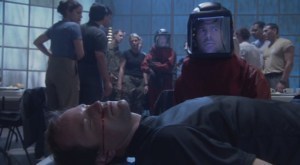 Upon watching this again after so many years, I still find the Weir-Sheppard confrontation bizarre – but enjoyed the episode much more as a whole. Akemi, for her part, was much less enthusiastic because she had trouble following the last half. Nanites and EMP’s are about as familiar to her as natto and the songs of AKB48 are to me and so, despite multiple attempted explanations, she still didn’t know what the hell was going on. ”Very difficult episode, have to say,”she told me as those end credits rolled.
Upon watching this again after so many years, I still find the Weir-Sheppard confrontation bizarre – but enjoyed the episode much more as a whole. Akemi, for her part, was much less enthusiastic because she had trouble following the last half. Nanites and EMP’s are about as familiar to her as natto and the songs of AKB48 are to me and so, despite multiple attempted explanations, she still didn’t know what the hell was going on. ”Very difficult episode, have to say,”she told me as those end credits rolled.
As always, she had nice things to say about Rodney McKay: “He’s not just geek. He’s super geek!”
But continues to have somewhat more conflicted feelings when it comes to Sheppard (“Why his name is Sheppard? Like dog?”). She found him arrogant and annoying in his clash with Weir, who turned out to be right by the way, and his 11th hour solution didn’t redeem him in her eyes. Ultimately, her problem with the character stems from his role as dashing hero. In her words: “He is ideal main character. Too perfect.” As opposed to: “Eli more humanish.”
So, what do you all think? Is Sheppard too perfectly heroic? What did you think of Hot Zone? Chime in!


Joseph Mallozzi's Blog
- Joseph Mallozzi's profile
- 39 followers


